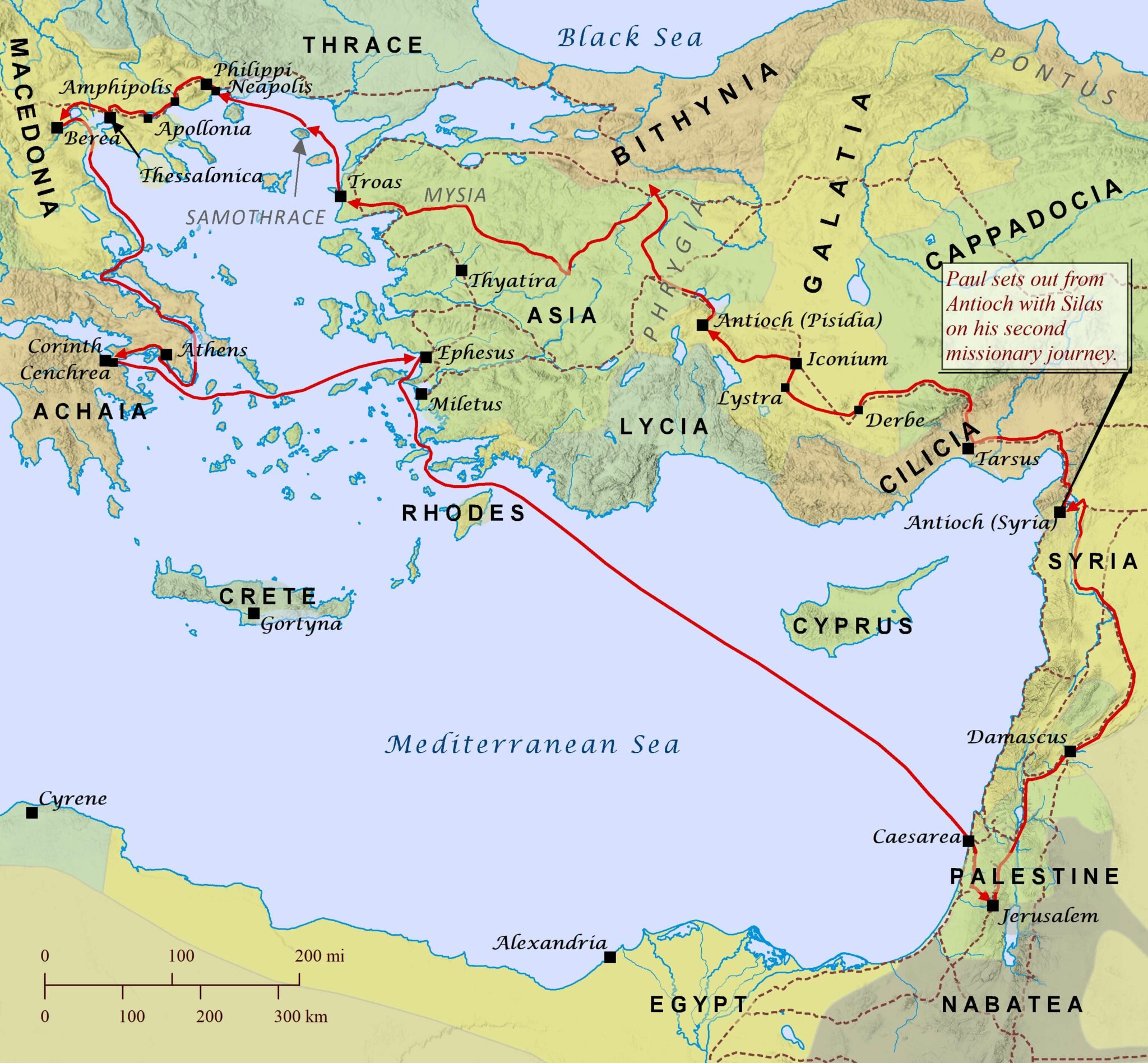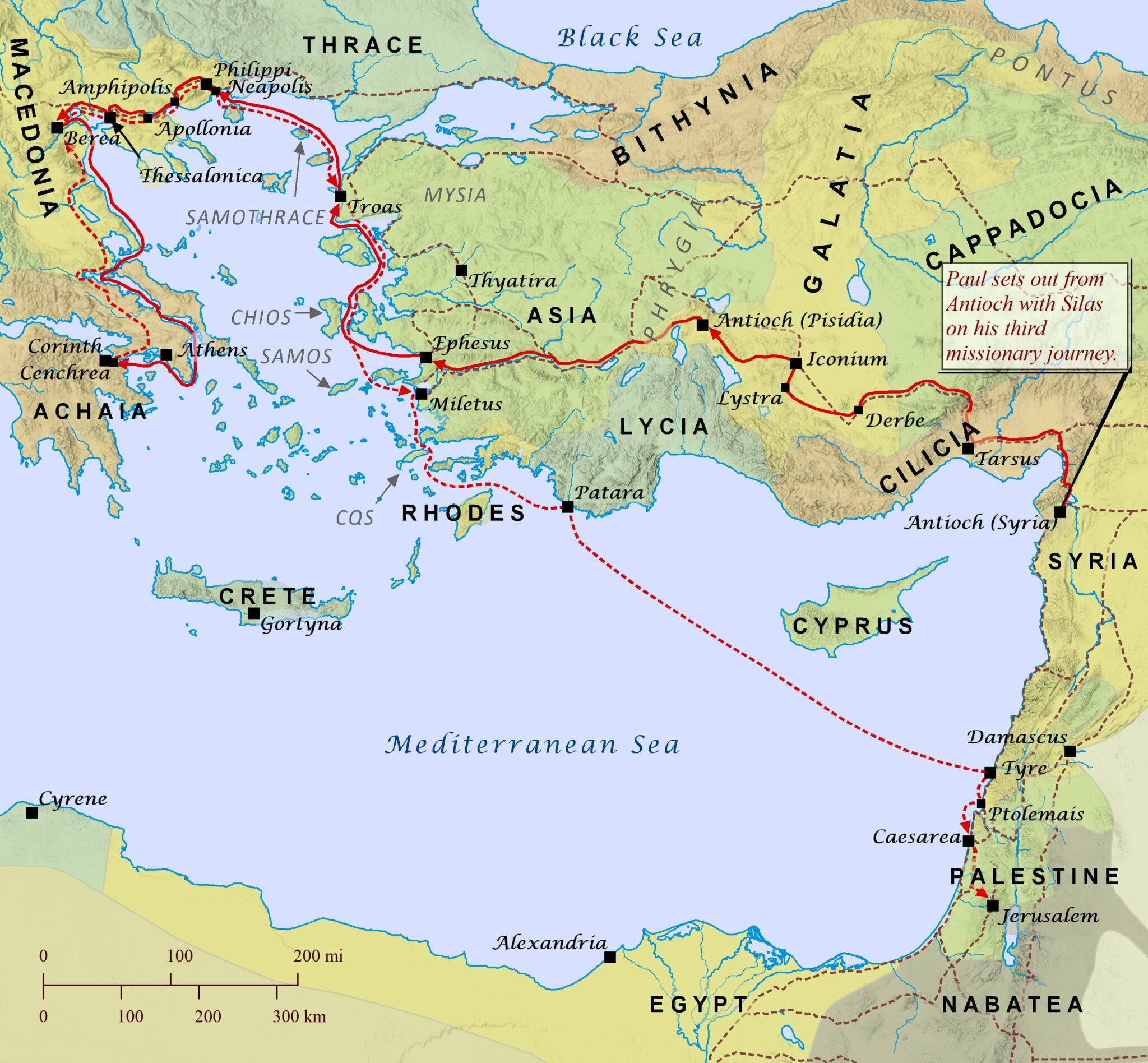Paul concludes his letter to Philemon asking him to prepare a place for him to stay whenever he is able to come and sends him greetings from some believers who are serving with Paul who knew Philemon. Paul finishes his letter with a blessing.
Paul completed his letter with one additional request, a few greetings from some brothers in Christ who personally knew Philemon, and a final blessing.
The request was for Philemon to prepare me a lodging, for I hope that through your prayers I will be given to you. This indicates that Paul was likely nearing the end of his imprisonment in Rome under house arrest. And Paul knew he would soon be released. Paul attributed this to God answering Philemon’s prayers. Indeed, countless Gentile believers were likely praying for this very thing.
Even as he was active in Rome, Paul was busy making plans for how he could further advance the gospel. And among his post-imprisonment plans was to personally come to Colossae and thank Philemon for his great service. Paul hoped to stay at Philemon’s house when he visited Colossae. It seems reasonable to presume that Paul mentions this to remind Philemon that whatever decision he made would be made with full transparency. It is a spiritual reality that all decisions will be brought fully into light (Hebrews 4:13).
Paul concluded his epistle by mentioning five brothers in Christ who also sent their greetings to Philemon. The men were Epaphras, Mark, Aristarchus, Demas, and Luke. These five men were with Paul in Rome at the time that he wrote this etter. It is likely that all of them and Philemon personally knew one another. At the very least Philemon knew of them.
The first man Paul named was Epaphras. Epaphras was a believer from Colossae. In Paul’s letter to the Colossians, he is mentioned twice:
“We give thanks to God, the Father of our Lord Jesus Christ, praying always for you, 4 since we heard of your faith in Christ Jesus and the love which you have for all the saints; 5 because of the hope laid up for you in heaven, of which you previously heard in the word of truth, the gospel 6 which has come to you, just as in all the world also it is constantly bearing fruit and increasing, even as it has been doing in you also since the day you heard of it and understood the grace of God in truth; 7 just as you learned it from Epaphras, our beloved fellow bond-servant, who is a faithful servant of Christ on our behalf, 8 and he also informed us of your love in the Spirit.”
(Colossian 1:3-8)
“Epaphras, who is one of your number, a bondslave of Jesus Christ, sends you his greetings, always laboring earnestly for you in his prayers, that you may stand perfect and fully assured in all the will of God. 13 For I testify for him that he has a deep concern for you and for those who are in Laodicea and Hierapolis”
(Colossian 4:12-13)
From these two passages we learn that Epaphras was the one who brought the gospel to Colossae (Colossians 1:7). Because Paul indicated that he had never been to Colossae (he had “heard of their faith”—Colossians 1:4); it is believed that Epaphras learned the Gospel from Paul during the apostle’s two year stay in nearby Ephesus on his second missionary journey (Acts 19:10).
In his letter to the Colossian church (written and delivered at the same time as this one) Paul described Epaphras as “our fellow bond-servant, who is a faithful servant of Christ” (Colossians 1:7) and as “one of your number, a bondslave of Jesus Christ” (Colossians 4:12). In Philemon, Paul described Epaphras as my fellow prisoner in Christ Jesus. These descriptions suggest that Epaphras was imprisoned in Rome alongside Paul on separate charges for the sake of Jesus and His gospel.
It was through Epaphras that Paul had learned so much about the church in Colossae (Colossians 1:7). While in Rome, Epaphras fervently prayed for Colossae, and the nearby towns of Laodicea and Hierapolis, that they would stand complete and fully assured of God’s will in the trials they faced (Colossians 4:12-13).
Epaphras is not mentioned anywhere else in scripture.
After writing Epaphras greets you, Paul mentioned four other men who did as well. All four are described as my fellow workers. All four are likewise mentioned in Paul’s letter to the Colossians (Colossians 4:10; 4:14).
Mark is the next man Paul references. Mark was the author of the gospel bearing his name. He was a follower of Jesus, and a cousin of Barnabas (Colossians 4:10). He later became a coworker with Paul and Barnabas on Paul’s first missionary journey (Acts 12:25-13:13). Mark left about part-way through, to the frustration of Paul (Acts 13:13). This frustration caused a bitter dispute between Paul and Barnabas over whether or not Mark should join them on their second journey (Acts 16:36-40). But apparently Mark came back into favor with Paul; perhaps this took place when Mark came to visit and serve him during his imprisonment in Rome.
Mark is mentioned in Colossians where Paul promises to send the believers instructions for how they are to receive him if he comes (Colossians 4:10). At the end of his life Paul requested Timothy to bring Mark to him, because “he is useful to me for service” (2 Timothy 4:11).
Aristarchus was the third man who greets Philemon at the end of this letter. He is described in Paul’s letter to the Colossians as my fellow prisoner (Colossians 4:10). Aristarchus was a Macedonian believer from Thessalonica (Acts 27:2). He was with Paul when the followers of Artemis stirred up a riot against Paul in Ephesus (Acts 19:29). He journeyed with Paul on his ill-fated voyage to Rome and apparently remained with him in prison. This likely explains why Paul described Aristarchus in his letter to the Colossians as my fellow prisoner (Colossians 4:10).
Aristarchus is not mentioned anywhere else in the Bible.
Demas was the fourth man who greets Philemon at the end of this letter. He too was mentioned in Colossians 4:14. He too was described as one of Paul’s fellow workers. Demas was with Paul and a fellow worker during his first imprisonment in Rome. But unfortunately, later on Demas seemed to have abandoned Paul during his time of need as the apostle awaited execution under Nero. Paul wrote of Demas’s departure to Timothy in particularly harsh terms:
“for Demas, having loved this present world, has deserted me and gone to Thessalonica. Crescens has gone to Galatia, Titus to Dalmatia.”(2 Timothy 4:10)
Paul’s harsh comments about Demas suggest that his desertion was out of cowardice. His desertion does not mean that he was not a believer in Jesus or a member of God’s eternal family. On the contrary, his faithful service for a time indicated that he did believe Jesus and receive the gift of eternal life. The gift of eternal life is eternally given for believing in Jesus alone (John 3:16, Ephesians 2:8-9). The gift of eternal life has nothing to do with our works. On the other hand, the prize of eternal life, our reward or inheritance, is dependent upon how well we walk by faith in this life. Speaking of the prize of eternal life, Paul wrote to Timothy, “If we endure, we will also reign with Him; If we deny Him, He also will deny us” reigning with Him (2 Timothy 2:10). Apparently, Demas did not endure. If true, he would have lost his eternal reward for shirking the gospel when he abandoned Paul. But Demas had not been faithless at the time Paul wrote this letter to Philemon.
The last and final of the fellow workers Paul mentions is Luke. Luke was the author of both the Gospel of Luke and of Acts, which is the Bible’s historical record of the Apostolic church. Luke joined Paul at Troas on Paul’s second missionary journey (Acts 16:8-10). It is as this point that his narrative of Acts shifts from third person to first person. Luke was an eyewitness for many of the later events of that book. In Colossians, Luke is grouped with Epaphras and Demas and not with Aristarchus, Mark, and Justus who were identified as kingdom workers “who are from the circumcision” (Colossians 4:11). The phrase “from the circumcision” means those who were Jews. This suggests that Luke was not a Jew, but a Gentile. If true, he is the only named Gentile who wrote a book of the New Testament.
Paul ends his short epistle to Philemon with a final blessing. The grace of the Lord Jesus Christ be with your spirit. His blessing is a prayer for Christ’s grace to be with Philemon’s spirit. We always need God’s grace (John 15:5). If Philemon is like most of us, he would especially need God’s grace to exercise grace himself, and forgive and release Onesimus with his blessing. Philemon was being asked to do something very difficult. But this is the pattern of the Bible; God asks hard things of those who are faithful to Him. God asked hard things of Abraham, the father of those who are of faith, asking Abraham to leave his home and family to go to a place he had not seen (Romans 4:11-12, Genesis 12:1-3). Abraham is one of many Old Testament saints held up as examples of faith for us to emulate (Hebrews 11). The Bible makes clear that God asks those who believe in Him to do hard things in order to reward them greatly. The Apostle Paul spoke of this often, here in his letter to the church at Corinth saying the rewards God has for those who follow Him faithfully through difficulty are beyond anything we can even comprehend:
“THINGS WHICH EYE HAS NOT SEEN AND EAR HAS NOT HEARD,
AND WHICH HAVE NOT ENTERED THE HEART OF MAN,
ALL THAT GOD HAS PREPARED FOR THOSE WHO LOVE HIM.”
(1 Corinthians 2:9)
In making this statement, Paul quotes the Old Testament (Isaiah 64:4, 65:17) which makes it clear that this has always been God’s approach to humanity.
Paul’s request of Philemon to exercise such great forgiveness can stand as an admonition for us to live a life of forgiveness. (See commentary on the Lord’s Prayer, where forgiving others is the centerpiece of Jesus’s teaching).
Biblical Text
22 At the same time also prepare me a lodging, for I hope that through your prayers I will be given to you. 23 Epaphras, my fellow prisoner in Christ Jesus, greets you, 24 as do Mark, Aristarchus, Demas, Luke, my fellow workers. 25 The grace of the Lord Jesus Christ be with your spirit.
Check out our other commentaries:
-
Numbers 2:10-16 meaning
The three tribes assigned to camp on the south side of the tabernacle were Reuben, Simeon, and Gad. These tribes were to move out second...... -
Matthew 23:11-12 meaning
Jesus teaches that the remedies for Bad Religion is humility before God and others, as well as contentment in serving regardless of earthly recognition. These...... -
Deuteronomy 25:11-12 meaning
This law prescribed to cut off the hand of a wife who sought to deliver her husband in a fight by seizing the genitals of...... -
2 Thessalonians 3:6-15 meaning
Paul deals with an issue within the Thessalonian church. There are some believers who aren’t providing for themselves by refusing to work. ...... -
Matthew 5:38-42 meaning
Jesus flips the world system of ‘justice’ on its head. He tells His disciples to seek out opportunities to serve rather than looking for opportunities......




